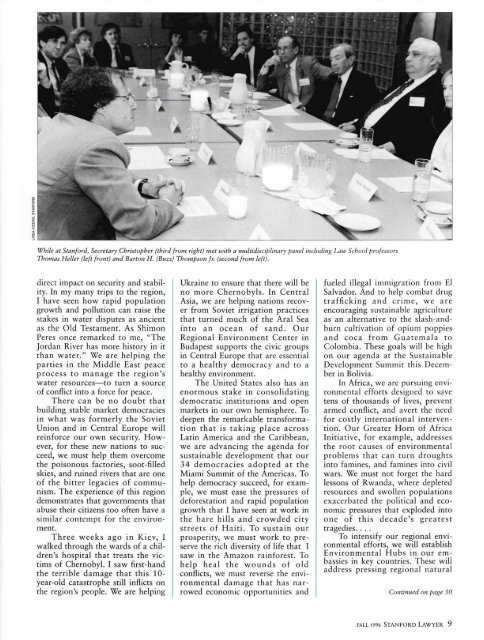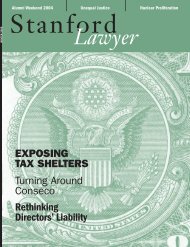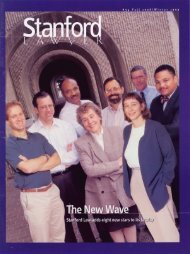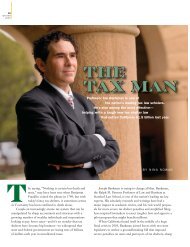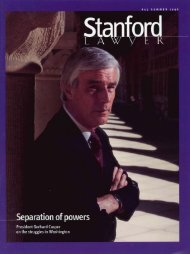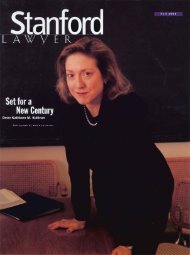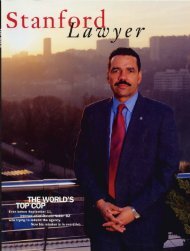Fall 1996 – Issue 50 - Stanford Lawyer - Stanford University
Fall 1996 – Issue 50 - Stanford Lawyer - Stanford University
Fall 1996 – Issue 50 - Stanford Lawyer - Stanford University
You also want an ePaper? Increase the reach of your titles
YUMPU automatically turns print PDFs into web optimized ePapers that Google loves.
While at <strong>Stanford</strong>, Secretary Christopher (third from right) met with a multidisciplinary panel including Law School professors<br />
Thomas Heller (left front) and Barton H. (Buzz) Thompson Jr. (second from left).<br />
direct impact on security and stability.<br />
In my many trips to the region,<br />
I have seen how rapid population<br />
growth and pollution can raise the<br />
stakes in water disputes as ancient<br />
as the Old Testament. As Shimon<br />
Peres once remarked to me, "The<br />
Jordan River has more history in it<br />
than water." We are helping the<br />
parties in the Middle East peace<br />
process to manage the region's<br />
water resources-to turn a source<br />
of conflict into a force for peace.<br />
There can be no doubt that<br />
building stable market democracies<br />
in what was formerly the Soviet<br />
Union and in Central Europe will<br />
reinforce our own security. However,<br />
for these new nations to succeed,<br />
we must help them overcome<br />
the poisonous factories, soot-filled<br />
skies, and ruined rivers that are one<br />
of the bitter legacies of communism.<br />
The experience of this region<br />
demonstrates that governments that<br />
abuse their citizens too often have a<br />
similar contempt for the environment.<br />
Three weeks ago in Kiev, I<br />
walked through the wards of a children's<br />
hospital that treats the victims<br />
of Chernobyl. I saw first-hand<br />
the terrible damage that this 10<br />
year-old catastrophe still inflicts on<br />
the region's people. We are helping<br />
Ukraine to ensure that there will be<br />
no more Chernobyls. In Central<br />
Asia, we are helping nations recover<br />
from Soviet irrigation practices<br />
that turned much of the Aral Sea<br />
into an ocean of sand. Our<br />
Regional Environment Center in<br />
Budapest supports the civic groups<br />
in Central Europe that are essential<br />
to a healthy democracy and to a<br />
healthy environment.<br />
The United States also has an<br />
enormous stake in consolidating<br />
democratic institutions and open<br />
markets in our own hemisphere. To<br />
deepen the remarkable transformation<br />
that is taking place across<br />
Latin America and the Caribbean,<br />
we are advancing the agenda for<br />
sustainable development that our<br />
34 democracies adopted at the<br />
Miami Summit of the Americas. To<br />
help democracy succeed, for example,<br />
we must ease the pressures of<br />
deforestation and rapid population<br />
growth that I have seen at work in<br />
the bare hills and crowded city<br />
streets of Haiti. To sustain our<br />
prosperity, we must work to preserve<br />
the rich diversity of life that I<br />
saw in the Amazon rainforest. To<br />
help heal the wounds of old<br />
conflicts, we must reverse the environmental<br />
damage that has narrowed<br />
economic opportunities and<br />
fueled illegal immigration from EI<br />
Salvador. And to help combat drug<br />
trafficking and crime, we are<br />
encouraging sustainable agriculture<br />
as an alternative to the slash-andburn<br />
cultivation of opium poppies<br />
and coca from Guatemala to<br />
Colombia. These goals will be high<br />
on our agenda at the Sustainable<br />
Development Summit this December<br />
in Bolivia.<br />
In Africa, we are pursuing environmental<br />
efforts designed to save<br />
tens of thousands of lives, prevent<br />
armed conflict, and avert the need<br />
for costly international intervention.<br />
Our Greater Horn of Africa<br />
Initiative, for example, addresses<br />
the root causes of environmental<br />
problems that can turn droughts<br />
into famines, and famines into civil<br />
wars. We must not forget the hard<br />
lessons of Rwanda, where depleted<br />
resources and swollen populations<br />
exacerbated the political and economic<br />
pressures that exploded into<br />
one of this decade's greatest<br />
tragedies....<br />
To intensify our regional environmental<br />
efforts, we will establish<br />
Environmental Hubs in our embassies<br />
in key countries. These will<br />
address pressing regional natural<br />
Continued on page 30<br />
FALL <strong>1996</strong> STANFORD LAWYER 9


